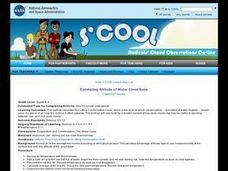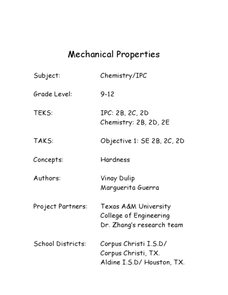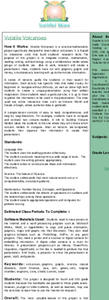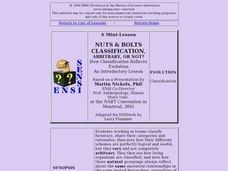Curated OER
Pendulum Lab
Learners predict how changing the pendulum components affect its period. In this physics lesson, students calculate the period using different masses. They analyze lab result and complete assigned worksheet.
Curated OER
Wind
Fourth graders watch an experiment that demonstrates the causes of wind. They design and make an original weather craft.
Curated OER
Estimating Altitude of Water Cloud Base
Students conduct an experiment to determine dew point and use a formula to detemine altitude. They construct a chart and predict what altitude clouds would form, given the dew point on the ground.
Curated OER
Chromosome Fusion
Learners see how patterns can reveal events of the past, thereby merging elements of both experimental and historical science.
Curated OER
Kwanzaa Science
Pupils study the parts of a plant in order to better understand the muhindi as one of the seven symbols of Kwanzaa.
Curated OER
What Does It Eat?
Students, working in research teams, investigate the eating habits of crickets. They collect and record data and compare their methods and results with other groups by making tables or graphs. They sumarize their findings with posters or...
Curated OER
Piece of the Sky: Introduction for Making S'COOL Observations
Students observe and discuss cloud cover. They identify percent of cloud cover, calculate cloud cover by fraction and convert to a percent, and compare their models with the current real sky cloud cover.
Curated OER
Comparing Weather Conditions
Students conduct research on temperature, wind speed and weather conditions from a variety of areas. They organize their findings on worksheets and spreadsheets and discuss various examples of databases.
Curated OER
Eat Your Sprouts Part I
Students will conduct a lab on the oxidation of an apple. The students will learn that the oxidation process can be halted when lemon juice is applied to the flesh of an apple because the lemon juice contains vitamin C, an antioxidant....
Curated OER
Laetoli Trackway Puzzle
Students try to reach a "best explanation" after viewing diagrams. In this trackway lesson students complete several worksheets, make observations and hypothesize.
Curated OER
Blocks And Screws (or "screwy Contrivances")
Students, given a block of wood and a screw or nail, are asked to put that screw or nail into a block. They examine how many contrivances and other imperfections found in living things are best explained by the process of evolution.
Curated OER
Show Me The Dinos
Students explore a site of numerous fossil excavations. Using an interactive quarry map, they locate dinosaur specimens and individual bones. In groups, students use "Show Me" cards to answer questions, compile information, and create...
Curated OER
Mechanical Properties
Students explore the concept of hardness. In this physical science lesson plan, students will be using clay heated at different temperatures to study hardness based on the indention left. Students will also be identifying the variables...
Curated OER
A Scientific Approach to Teaching about Evolution
Middle schoolers examine fossils and analyzing their significance in relation to theories of evolution. Hand-outs are provided. This lesson could be supplementary to a broader unit on evolution or geology.
Curated OER
Volatile Volcanoes
Students have fun with graphics, graphs and money, simultaneously learning with up-to-the-minute information.
Curated OER
Yeast Cells and Their Environment
Learners create their own experiment in which they have yeast cells growing in liquid environments. They examine the relationship between humans and microorganisms. They also practice using the scientific method.
Curated OER
What Killed the Dinosaurs?
Young scholars demonstrate how scientists use evidence to formulate hypotheses. They write an essay describing the Cretaceous and Paleocene time periods from the point of view of someone living in that time. In addition, they formulate...
Curated OER
What Can Pseudogenes Tell Us About Common Ancestry?
Students compare/constrast DNA sequence data for a portion of the rat GULO gene to the corresponding sequence in the inactive GULO gene in humans, chimpanzees, orangutans, and crab-eating macaques by identifying the shared sequences in...
Curated OER
The Planets Moon
Students explore the theories of the creation of the universe and examine the properties of celestial bodies. They analyze the relationship between the sun, Earth and other planets. They discover the infinite potential of the science of...
Curated OER
Pulsar Stars And Black Holes
Students explore the discovery of pulsar stars, and the characteristics of pulsar stars. Theories and ideas behind black holes are discussed. The issues of women's historical role in science are also touched on.
Curated OER
Nuts & Bolts: is Classification, Arbitrary, Or Not?
Students, in groups, classify furniture, share their categories and rationales, then note how their different schemes vary, perfectly logical and useful, but completely arbitrary.
Curated OER
Contrivances: Orchids and the Panda's Thumb
Students read and discuss selected and edited excerpts from the essays of Stephen Jay Gould on the subject of contrivances.
Curated OER
DNA-a Molecular Identity
Young scholars explore about what DNA is and several different DNA typing techniques. They examine three different situations where DNA typing was used to carry out justice. Students also identify and evaluate different uses of DNA...
Curated OER
Merging Art and Science?
Students approach science through artwork. For this art and science lesson students work together to develop theories and gather data.
Other popular searches
- History and Nature of Science
- The Nature of Science
- Nature of Science Biology
- Nature of Science Inquiry
- Nature of Science Physics
- History Nature of Science
- Science Patterns in Nature
- Genetics Nature of Science
- Teaching Nature of Science
- Nature of Science Weather
- Genetic Nature of Science
- Science and Nature

























